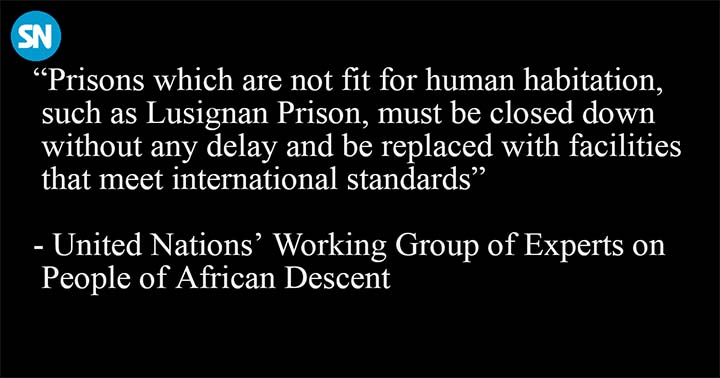The Lusignan Prison should be closed down without delay, according to the United Nations’ Working Group of Experts on People of African Descent, which says the facility is “not fit for human habitation.”
In a preliminary report last Friday, presented upon the conclusion of a five-day visit to Guyana, the Group issued a raft of recommendations addressing the state of the country’s penal system, stating that steps should be taken to improve the infrastructure and hygienic conditions within prisons, bringing them within international standards.
“All prisons must be operated in accordance with international human rights obligations, including the Mandela Rules,” it said, while adding that overcrowding within prisons and detention centres must be approached with urgency.
The United Nations Standard Minimum Rules for the Treatment of Prisoners, also known as the Mandela Rules, consists of 122 rules listed under various categories.
Under “Accommodation,” Rule 12 states that if sleeping accommodations are in individual cells or rooms, each prisoner should occupy their own cell/room. It further stated that if overcrowding should arise, and an exception to the rule has to be made, it is “not desirable” to have two prisoners within the same space.
In the case of dormitories, the rules state that the inhabitants should be carefully selected to ensure they are suitable to associate with each other in those conditions, and should receive regular supervision at night.
The rules of accommodation also cater for adequate shower and sanitary hygiene arrangements, as well as natural lighting and ventilation within the prisons. Adequate lighting was deemed to be important to allow prisoners to read by the light, and if this was not possible, the rules state that “artificial light shall be provided sufficient for the prisoners to read or work without injury to eyesight.”
Rule 21, written under the category of “Clothing and bedding,” states that “Every prisoner shall, in accordance with local or national standards, be provided with a separate bed and with separate and sufficient bedding which shall be clean when issued, kept in good order and changed often enough to ensure its cleanliness.”
“Prisons which are not fit for human habitation, such as Lusignan Prison, must be closed down without any delay and be replaced with facilities that meet international standards,” the preliminary report advised. The same advice was extended for the country’s juvenile detention centres.
In July, around 1,000 prisoners were taken to Lusignan for accommodation after a fire gutted the Camp Street jail.
At the Lusignan Prison, the transferred prisoners were housed in an open air holding section. With the conditions proving to be less than ideal, within weeks half of the prisoners were eventually relocated to other facilities across the country, and the remainder were spread between Lusignan’s main facility, and three holding areas constructed to accommodate them. They were intended to house approximately 450 prisoners.
Thirteen inmates had escaped from the holding facility at Lusignan on July 24, during a heavy downpour, after digging a tunnel that took them under the fence and into the backlands. Twelve of them were recaptured while one was killed.
On Friday, Director of Prisons Gladwin Samuels told reporters that following the escape, a review of the system was done.
“…As a result of that, the necessary security measures were put in place. I can safely say that [although] the investigation is still somewhat ongoing, from all that has been presented so far, it is pointing to neglect of duty which resulted in the escape of the prisoners… the various layers of security was put in place but persons did not execute as was expected,” Samuels stated.
He said that the findings of the investigation will determine the level of disciplinary action that will be meted out.






